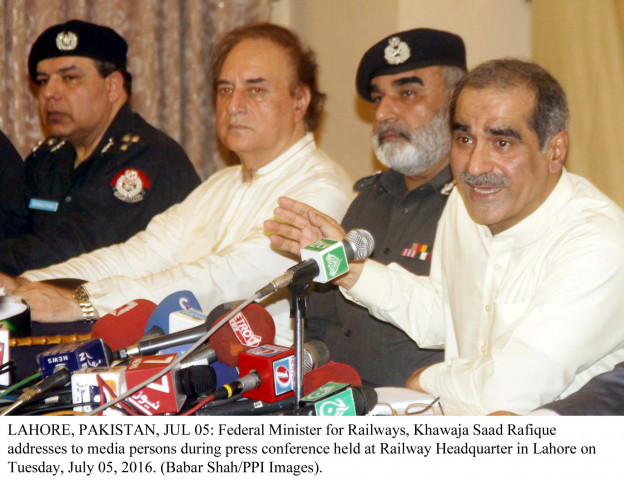Benazir’s family was all talk and no action in her murder case: Saad Rafique
Railways minister says verdicts in Panamagate and Benazir murder cases raise serious questions over judicial system

بے نظیر بھٹو قتل کیس میں حصول انصاف کیلیے ان کے ورثا اور پیپلز پارٹی نے زبانی جمع خرچ کے سوا کچھ نہیں کیا.
— Khawaja Saad Rafique (@KhSaad_Rafique) September 1, 2017
In a series of tweets, the Pakistan Muslim League-Nawaz (PML-N) leader also went on to claim that those who had staged sit-ins and the ones who had organised them behind the scenes were responsible for Gen (retd) Pervez Musharraf's escape from the country.
He added that Musharraf was involved in the murders of Benazir and former Balochistan governor and CM Akbar Bugti, responsible for the Lal Masjid massacre and had deposed the higher judiciary.
بےنظیر بھٹو، اکبر بگٹی،لال مسجد قتل عام اور ججز نظر بندی کے بڑے ملزم پرویز مشرف کے باھر جانے کا کریڈٹ دھرنا دینے اور دلوانے والوں کوجاتا ھے
— Khawaja Saad Rafique (@KhSaad_Rafique) September 1, 2017
Who killed Benazir Bhutto? The theories behind the murder
The minister also said that the verdicts in the Panamagate and Benazir murder cases had raised serious questions over the judicial system.
“Apparently, Gen Musharraf proved to be more powerful than the judicial system,” he added.
نوازشریف نا اھلی کیس اور بےنظیرقتل کیس کے نتائج نے نظام پر شبہات میں اضافہ کر دیا ھے.پرویز مشرف پاکستان کے نظام عدل سےزیادہ طاقتورثابت ھوۓ
— Khawaja Saad Rafique (@KhSaad_Rafique) September 1, 2017
Rafique's tweets came a day after an anti-terrorism court acquitted five accused in the Benazir murder case for want of evidence while branding former military ruler Musharraf a fugitive.
The judge not only declared Musharraf a proclaimed offender, but also ordered confiscation of his property. Musharraf is alleged to have been part of a broad conspiracy to have his political rival killed before elections. He has denied these allegations.
However, the former dictator is on the run and is residing in Britain these days.
The minister also claimed that the lawyers’ movement had managed to reinstate the judges deposed during Musharraf regime but was unable to restore its prestige and freedom.
عدلیہ بحالی تحریک کے نتیجے میں عدلیہ بحال کروا لی مگر اس کا وقار اور آزادی بحال نہیں کروا سکے.
— Khawaja Saad Rafique (@KhSaad_Rafique) September 1, 2017
“To defeat our external enemies, we need to discuss our internal problems,” he maintained.
"If there is no national dialogue for a transparent and strong democratic system, the internal unrest will increase."
بیرونی دشمنوں کی ناکامی کے لیے اندرونی مسائل بات چیت سے ھی حل کرنا ھونگے.
— Khawaja Saad Rafique (@KhSaad_Rafique) September 1, 2017
شفاف اور طاقتور جمہوری نظام کے لیے قومی مکالمہ نہُ کیا گیا تو داخلی انتشار بڑھ جائیگا.
— Khawaja Saad Rafique (@KhSaad_Rafique) September 1, 2017



















COMMENTS
Comments are moderated and generally will be posted if they are on-topic and not abusive.
For more information, please see our Comments FAQ